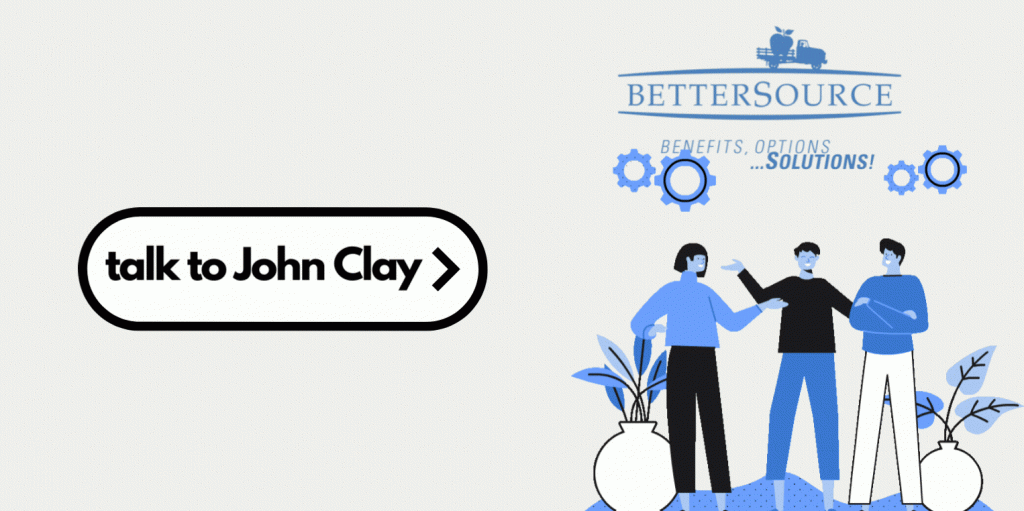Business Lexington – July, 2023 – John Clay, BetterSourceBenefits
Breaking Through The Benefits Status Quo
Download the full article here >>
In the 1990s, while working as a benefi ts advisor for Blue Cross Blue Shield of Kentucky, John Clay realized he could do more to help his customers. Over the course of the decade, Blue Cross Blue Shield of Kentucky eventually transformed to become Anthem Blue Cross Blue Shield, transitioning from a mutual company owned by policyholders to a publicly traded company owned by stockholders.
This change didn’t sit well with Clay. Feeling unsatisfied with simply working out renewal programs with a limited number of insurance companies, Clay joined a “mastermind group” of advisors from across the country who were dedicated to making a difference in the lives of employers and employees.
“I already had a background in inventory control and material management. So, we started managing the healthcare supply chain,” Clay said. “We put our custom-designed plans that were in the best interest of employers and their employees in a fiduciary or legal and ethical way.”
In 2000, Clay, who graduated from the University of Kentucky Gatton College of Business with a degree in supply chain management, founded Better Source Benefits, a boutique healthcare benefits agency based in Somerset. Better Source Benefits operates throughout Kentucky, Ohio, Tennessee, and New York. His clients range from companies with as few as 100 employees to those with as many as 5,000 employees.
Clay primarily serves the construction, energy, and manufacturing industries, as well as nonprofit organizations such as city and county governments.
Clay prefers to be known as a strategy expert rather than a consultant, believing that companies need targeted strategies to break free from the status quo of rising premiums and diluted healthcare options found in many employee benefit plans.
“Better healthcare outcomes with less risk and lower prices are what companies need,” Clay said.
Three insurance companies dominate Kentucky’s healthcare benefit marketplace: Anthem, United Healthcare, and Humana. Recently, Humana announced its withdrawal from the Employer Group Commercial Medical Products business in the state. Clay urges CEOs and CFOs to take a more active role in selecting employee benefit plans rather than leaving it solely to the human resources director. He highlights this scenario in his book, “Breaking Through The Status Quo.”
According to Clay, the average business owner is often uninvolved in benefit sales conversations. And while the CFOs focus on the profit and loss statement, they rarely discuss the strategic aspects of benefits plans with the HR director. As a result, the cost of available plans continues to rise, but the CFO may not recognize opportunities for improvement.
Clay refers to this situation as the Status Quo scenario.
In “Breaking Through The Status Quo,” author John Clay outlines alternatives to the rising premiums and diluted healthcare options found in many employee benefit plans.
Clay said that inflation is also among the greatest challenges facing the employee benefits market in 2023. Healthcare inflation has consistently outpaced general inflation over the past 50 years, making it difficult for the employers to meet the growing demands of employees seeking more robust benefits packages, he said.
Additionally, the employee benefits marketplace faces challenges related to the lingering economic effects of COVID-19, increased usage of prescription drugs, mental health and substance abuse issues, and advancements in medical treatments and technology.
All of these factors lead to higher cost and diminished benefits for employees, Clay said.
“The term Affordable Care Act is a misnomer because it is anything but,” he said. “Look at the minimum wage for some people. It may be $15 an hour or about $31,000 a year. If their insurance deductible is $3,000, that’s about 10% of their gross wages and their out-of-pocket could be $5,500 to $8,000. Then they are functionally uninsured with many of the “off the shelf” ACA plans unless they have subsidies.”
Clay cites a recent survey that found more than half of the respondents said they could not afford a $400 emergency room charge or any other kind of financial emergency. Few could afford a catastrophic event.
“You have a huge percentage of the population with medical debt.” Clay said. “Better Source Benefits is focused on reducing or eliminating medical debt through employee plan design and solid supply chain management.” BL


